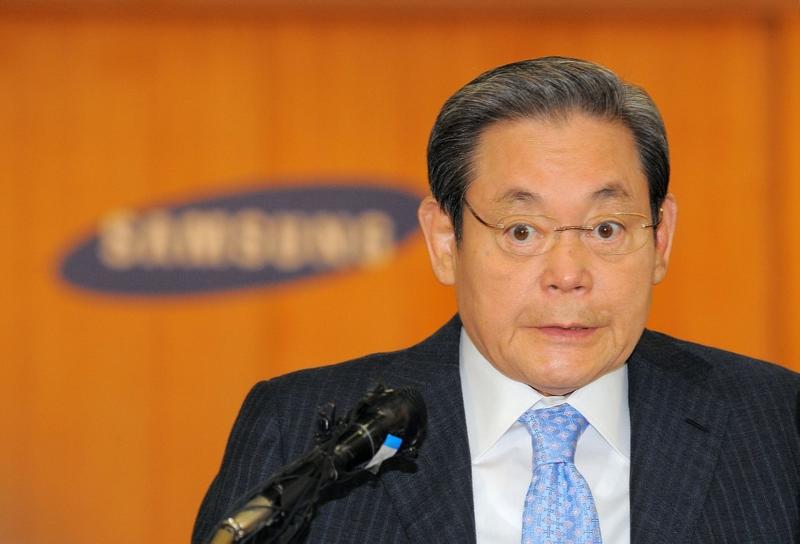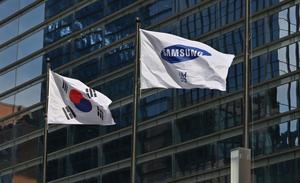 In this file photo, Lee Kun-hee, chairman of South Korea's largest group Samsung, speaks during a press conference at the group's headquarters in Seoul on April 22, 2008. (JUNG YEON-JE / AFP)
In this file photo, Lee Kun-hee, chairman of South Korea's largest group Samsung, speaks during a press conference at the group's headquarters in Seoul on April 22, 2008. (JUNG YEON-JE / AFP)
Lee Kun-hee, who transformed Samsung Electronics Co from a South Korean appliance maker into the world’s biggest producer of smartphones, televisions and memory chips, has died. He was 78.
Lee passed away on Sunday with his family by his side, the company said in a statement, without mentioning the cause of death. His family will hold a private funeral. He had surgery in 2014 after a heart attack and was treated for lung cancer in the late 1990s.
Lee passed away on Sunday with his family by his side, the company said in a statement, without mentioning the cause of death. His family will hold a private funeral. He had surgery in 2014 after a heart attack and was treated for lung cancer in the late 1990s
Lee, who told employees to “change everything except your wife and children” during his drive to foster innovation and challenge rivals such as Sony Corp, was South Korea’s richest person. He had an estimated net worth of US$20.7 billion, according to the Bloomberg Billionaires Index. Samsung, the biggest of South Korea’s family-run industrial groups, known as chaebol, has been led by his only son since the heart attack.
“Chairman Lee was a true visionary who transformed Samsung into the world-leading innovator and industrial powerhouse from a local business,” the company said. “His legacy will be everlasting.”
The reins are now set to pass to his only son Jay Y Lee, who’s been the conglomerate’s de facto leader since his father’s hospitalization in 2014. Lee is expected to eventually inherit a US$300 billion company that’s riding a COVID-19-era boom in online activity. Samsung, the maker of the Galaxy line of smartphones, also supplies semiconductors for Google’s data centers and Apple Inc’s iPhone. It’s the world’s most advanced maker of displays for TVs, computers and mobile devices.
ALSO READ: S. Korea govt, Samsung team up to beat Japan chip curbs
The younger Lee is currently grappling with two simultaneous legal disputes with South Korean prosecutors over allegations of bribery and corruption, which he’s repeatedly denied.
It was Lee Kun-Hee who built the company into the electronics powerhouse of today, becoming synonymous with the rise of South Korea on a global economic stage.
Named one of the world’s 100 most influential people by Time magazine in 2005, Lee began overhauling Samsung Electronics after he saw the company’s products gathering dust in a Los Angeles electronics store, according to “The Lee Kun Hee Story,” a 2010 biography by Lee Kyung-sik.
The Suwon, South Korea-based company had become known for cheap, low-quality electronics gear and was in the “second phase of cancer,” sending out 6,000 people to fix products made by 30,000 employees, Lee said in 1993, according to the biography.
 A Samsung flag (right) and South Korean national flag flutter outside the company's Seocho building in Seoul on October 25, 2020. Samsung Electronics chairman Lee Kun-hee, who transformed the South Korean firm into a global tech titan, died at the age of 78 on October 25, the company said. (JUNG YEON-JE / AFP)
A Samsung flag (right) and South Korean national flag flutter outside the company's Seocho building in Seoul on October 25, 2020. Samsung Electronics chairman Lee Kun-hee, who transformed the South Korean firm into a global tech titan, died at the age of 78 on October 25, the company said. (JUNG YEON-JE / AFP)
The company’s makeover started in 1993 when Lee gathered top executives in Germany and laid out a plan, known as the Frankfurt Declaration, to transform Samsung from a second-tier television maker into an industry leader. The company’s new mission: create high-quality products, even if it meant lower sales.
Samsung Electronics became the world’s top maker of computer memory chips in 1992, the same year it became the first to develop 64-megabyte DRAM chips, according to the company.
Samsung’s Origins
Lee was born on Jan 9, 1942, in Daegu about 240 kilometers (150 miles) south of Seoul, and was raised in the nearby rural district of Uiryeong, according to the company.
In 1938, his father Lee Byung-chull opened a four-story grocery store in Daegu that would later become Samsung Group.
As a teenager, Lee Kun-Hee liked movies and cars and kept to himself. He took up wrestling and played rugby in high school to fight loneliness. He graduated with a degree in economics from Waseda University in Tokyo and also studied business administration in the US at George Washington University in Washington.
In 1971, Lee Byung-chull chose his youngest son to be his successor, and in 1974, the company moved into semiconductors when it acquired a 50 percent stake in unprofitable Hankook Semiconductor. The business turned profitable in 1988, helped by dynamic random-access memory chips it produced.
ALSO READ: S. Korea seeks arrest warrant for Samsung heir in merger probe
After the Frankfurt Declaration, Lee required employees to arrive at work at 7 am instead of their usual 8:30 am start, so they could “soak up reform in their slumber,” according to the biography.
In 1995, he assembled 2,000 workers to watch him make a bonfire out of 150,000 mobile phones, fax machines and other company products that didn’t meet his quality standards.
Lee’s cultural change eventually produced results. Samsung Electronics surpassed Tokyo-based Sony to become the top seller of flat-screen TVs in 2006, the same year its market value exceeded US$100 billion.
In 2010, Samsung introduced the Galaxy-branded smartphone running Alphabet Inc’s Android software, which helped it pass Apple as the world’s biggest smartphone maker in 2011 in terms of units sold. By introducing the Galaxy Note in 2011, Samsung created a new product niche known as the phablet, a smartphone-tablet hybrid.
Political Controversy
Samsung became the biggest seller of all mobile phones in 2012, unseating Nokia, which had been the industry leader for more than a decade. Its success in smartphones then boosted profits at its component businesses, including memory chips, display and processors.
Lee’s career was also notable for its setbacks and controversies. An expansion into the car business was unsuccessful. Samsung Motor Inc rolled out its first automobiles in 1998 and failed to attract buyers. The unit was placed into receivership and Renault SA purchased a majority stake in 2000.
Lee was mired in political scandals in the late 1990s after being convicted of paying bribes to former president Roh Tae-woo in 1996. He was pardoned by President Kim Young-sam a year later.
In 2009, Lee was found guilty of tax evasion and breach of duty for causing losses at Samsung SDS Co, an information technology services provider, because he knew the company illegally sold bonds with warrants to his son at artificially low prices. He was fined 110 billion won (US$97.1 million) and received a suspended three-year jail sentence.
Presidential Pardon
Four months after the 2009 ruling, South Korea’s then-President Lee Myung-bak pardoned Lee, a member of the International Olympic Committee, so he could help the country’s successful bid to host the 2018 Winter Olympics in Pyeongchang.
Lee, who resigned from the board of Samsung Electronics in 2008 amid the controversies, returned as chairman in March 2010, telling employees the business was “facing a real crisis.”
“In 10 years, the majority of products that represent Samsung may no longer exist,” he said in a statement announcing his return. “We must have a new start. There is no time to hesitate.”
Two months later, Samsung Group said it would invest 23 trillion won to expand in areas such as health care and solar batteries by 2020.
Lee’s son, Jay Y. Lee, became vice chairman of Samsung Electronics in December 2012 and his daughter, Lee Boo-jin, is president of Hotel Shilla Co, a Samsung affiliate, raising concerns that the founding family would maintain its grip on the conglomerate at the expense of minority shareholders.
READ MORE: Samsung’s billionaire heir scores public win in graft probe
In August 2019, the Supreme Court ordered the retrial of Jay Y. Lee over bribery charges that voided an earlier decision to suspend Lee’s 2.5-year prison sentence. A special prosecutor had indicted the Samsung heir on charges of bribing a friend of former President Park Geun-hye in return for government backing for a merger that helped cement his control over Samsung while his father was hospitalized.
In 1967, Lee Kun-hee married Hong Ra-hee. In addition to children Jay Y and Boo-jin, he had a daughter, Lee Seo-hyun. Another daughter, Lee Yoon-hyung, died in 2005 at age 26.


